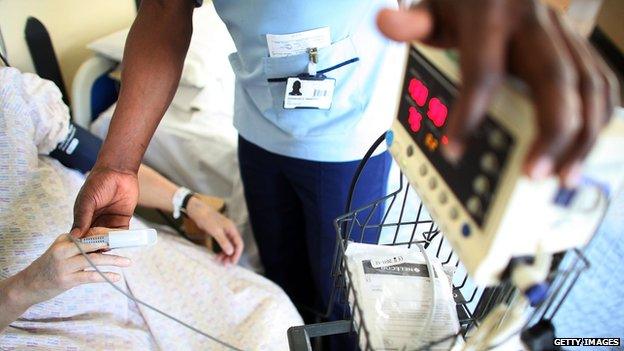Why not... privatise the NHS
- Published
- comments

A look at eye-catching policy ideas that are often talked about but never seem to feature in UK general election campaigns.
The background
The NHS was created by the post-war Labour government in 1948. For the first time, hospitals, doctors, nurses, pharmacists, dentists and opticians were brought together under one organisation to provide services free to the public at the point of delivery.
The central principle - that health services will be available to all and financed entirely from taxation - has been an article of faith in British politics ever since. David Cameron is the latest in a long succession of prime ministers to vow that the NHS is "safe" in his hands and would not be "privatised".
But privatisation is a slippery concept. Some see it in the opening up of NHS services to more private competition. Others argue that the word "privatisation" would only apply if Britain dismantled the NHS altogether and adopted a US-style private health insurance system instead - and that the NHS's status as "sacred cow" is blocking constructive debate about its future.
Thomas Cawston: The case for privatisation
Competition is a "bogey" word in the NHS.
Yet this hostility to competition and private providers is a uniquely British obsession.
Diverse providers of healthcare are common throughout Europe.
In Germany for example a third of hospitals are run by charities, a third by for-profit companies and a third by government. Sweden has invited private providers to provide GP clinics and hospital services. By contrast only 3% of the NHS budget is spent by private providers in England.
The reason for competition is that can drive real improvements in care.
To take one current example, patients with chronic back pain in Bedfordshire will soon enjoy a much better service. The local NHS has asked different organisations to suggest the best way to deliver all musculo-skeletal healthcare services for the next five years.
All qualified providers, including NHS hospitals, GP practices and private companies, are invited to submit bids to provide a world class service at the greatest value for money.
The winning bidder will be the one that gets the different parts of the NHS to work together successfully so that patients are treated as quickly as possible. The competition will deliver new thinking and NHS patients will benefit.
Competition also puts patients at the heart of the NHS.
Poll after poll shows patients value their right to choose which hospital to go to and what treatment they receive. Yet without competition patients would have to "like it or lump it" and choice remains the privilege of the rich who can afford to buy their way out of the system.
Opponents of competition argue that it will fragment NHS services.
In fact, those services are already fragmented, which is one cause of the current crisis in A&E admissions.
The Bedfordshire initiative shows that competition can join up NHS services, to the great benefit of patients.
Oliver Huitson: The case against privatisation
It is not clear where the evidence base for competitive, privatised health provision comes from.
This is perhaps why the Conservatives and the private health industry, including the "think tanks" they fund, rely on a handful of soundbites. Respectable economic theory and the evidence from real-life healthcare both disprove their case - competitive markets fit healthcare exceedingly poorly.
When markets are introduced into healthcare provision, providers chase income, costs soar, health outcomes suffer, fraud increases, and the system of universal care coverage collapses.
The public need only look at what's happening to out-of-hours care already - a stream of scandals, capped by an A&E crisis. Blaming this on NHS "fragmentation" is quite extraordinary. The privatised service, with less qualified staff to cut costs, has seen an increase of 50% in the rate of calls referred to A&E since 2010.
Sweden put "competition at the heart" of their NHS. "Choice" grew in affluent urban areas where privately-owned clinics pushing unnecessary care now abound. Of the 196 new clinics that opened in Sweden, all privately-owned, 195 were in wealthy areas.
The newly privatised Dutch system showed similar problems. The GP organisation tried to address it by asking newly qualified GPs to take positions in rural practices. For this "interference with the market" the national competition regulator fined the GP association 7.7m Euros!
Competition puts revenue, not patients, at the centre of care. It's a legal requirement for firms to maximise shareholder value - not patient wellbeing. This is why the public consistently oppose privatisation; it converts a public health service to a "fantastic business", in Cameron's words.
"Choice" is often a fantasy, as commissioners, patients and charities will soon learn; a warm buzzword used to mask the fact the NHS is being changed to a profit-led market without the public's consent.
- Published11 July 2013
- Published3 July 2013